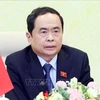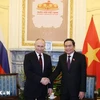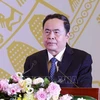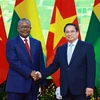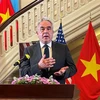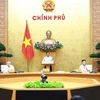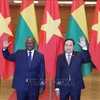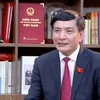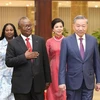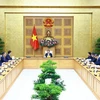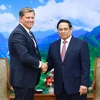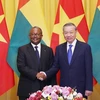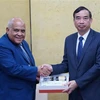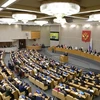Deputy Prime Minister Nguyen Thien Nhan delivered a speech at the 19th International Conference on the Future of Asia, which took place in Tokyo on May 23 under the theme: “ Asia ’s Search for Steps towards Stronger Ties and Integration.”
Following is the full text of the Deputy PM’s speech.
“It gives me great pleasure to attend the 19th International Conference on the Future of Asia under the theme: “ Asia ’s Search for Steps towards Stronger Ties and Integration”. I believe this topic is highly relevant to the common endeavor of Asian countries to enhance cooperation and integration for each country’s interest and the common benefit of the region and the world.
“I wish to thank the Nikkei Newspaper for giving me the opportunity to address this prestigious forum to share with you some ideas on the cooperation paths to forge a better future for our continent in an integrated world.
“Rapid and unpredictable developments have been unfolding in the regional and world situation with the emergence of many new issues and new opportunities affecting the future of our region and the world. These issues and opportunities are no longer limited to traditional domains like economics, politics, military etc. They have expanded to non-traditional areas such as environment pollution, climate change, water resources utilization, cyber security, maritime security and safety and so on. Thus, we are required to adopt new approaches and ideas on integration and connectivity.
“It is the view of many that dynamic development makes up the character of Asian economies. This view reflects the truth but the causes of it have not yet explained clearly. In my opinion, the growth over the long period of time and dynamics of many Asian economies lie on five factors: the driving forces from the domestics and international markets, the cooperation and integration among countries as the basic policy of governments, the similarities of cultures, the geographical proximity and the role of Government in management of national economies. In the context of international globalization and integration, although having different development levels, the Asian countries has long prioritized on cooperation and integration.
“What happened in Asia showed that cooperation and integration can only last if the interests of each country are harmonized with the interests of other countries and the common interests of the entire region.
“Joining a regional cooperation mechanism is one way to build confidence, hence, diminish the risk of conflict. Reality shows that in international relations, “confidence” and “cooperation” are inter-related. “Confidence” provides the basis for “cooperation”, while latter helps build and strengthen the former. More cooperation and confidence means less likelihood of conflict and better promotion of development for individual country and the entire region. Hence, Viet Nam has always actively and responsibly participated in the regional cooperation and integration frameworks.
“The cooperation among countries which is based on the works of governments and mutual political trust not only has the role in formulating and realizing the economic opportunities with market signals but also forming a collaboration among non-economic areas such as politics, climate change, education and training, health-care, science and technology, national defense, transportation safety, cyber security, anti-terrorism and cultural exchange …
“The Vietnamese has a proverb that reads: “one tree alone makes no mountain; three trees together make a high mountain”, or “In unity there is strength”. It means solidarity and cooperation always generate power.
“At the regional level, in order to overcome the existing formidable challenges and fulfill potentials, I believe we need to promote cooperation and integration in the following 3 directions:
“First, solidify and promote the existing cooperation mechanisms within ASEAN, among ASEAN with other countries such as Japan , the U.S. , Russia and China …, among ASEAN member countries with other countries, and enhance people-to-people exchanges for trust building. It has been proved that trust is the basic element and the precondition for countries to forge closer bonds and join efforts to overcome challenges.
“Second, deepen relations among countries via economic integration and promotion of FTAs. In relations among nations, economic interest is a core element. Therefore, strengthened economic cooperation also helps create a peaceful and stable environment in the region.
“Third, encourage cooperation on education and training, science and technology, climate change mitigation, utilization of common water resources, cyber security, economic development and poverty alleviation. This is key to the building of a world of equality, peace and development.
“The evolutions taking place in Asia – Pacific testify to the fact that cooperation and integration is an objective imperative and the best way to overcome challenges and realize the development potentials of each country, together build an Asia of peace, stability and development. This is because interest of each individual nation is invariably linked to that of others; development of an economy will contribute to the common prosperity of the entire region. Promoting cooperation and economic integration at multi-levels would also help maintain a peaceful and stable environment essential to each and every nation.
“The past years have seen Asia- Pacific’s far-reaching effective cooperation at various levels and in different areas. Much has been achieved, but we all know that challenges ahead are daunting. In order to continue maintaining dynamic growth, hence contributions to a more stable and prosperous region, we need to strengthen cooperation and integration in the six following areas:
“First, intensify trade and investment liberalization along with risk minimization of financial investment. Asia-Pacific economies have been taking the lead in promoting trade and investment liberalization. The ratio of export and import of goods and services of the regional economies averaged at some 21 percent of GDP in 2009 and have been continuing to grow on a year-to-year basis. In case of Vietnam today, it is over 130 percent of GDP . However, we still need to develop a more reliable system of financial statistics to provide timely data on the investment inflows in and outflows from each economy, which gives the essential basis for risk assessment of the financial market and establishment of financial monitoring system in the region and in the world. Until today, national statistics from all developed countries such as USA , Germany , Switzerland , UK , Canada , France , Japan and Singapore provide no data on international financial investment in their economies.
“Second, ensure the manpower supply for developed countries, which have aging population, and for developing countries, which lack high-skilled labor force. Human resources play an important role, even decisive in the pace and quality of all economies’ growth. In Asia – Pacific, some economies have abundant human resources while others have huge demand for importing trained and highly skilled labor. To support each other, we need to establish mechanisms and common regulations for promoting demand-based human resource development and create a managed flow of labor, which ensure mutual sustainable benefits among stakeholders.
“Third, step up the development of goods transport services. Transport is important foundation for promoting trade and investment. With the average growth rate of 5.6% in 2012 and the share of 40% of world economy, Asia – Pacific has huge demand for developing goods transport services in a unified manner, from planning of sea port system to training of human resources and ensuring maritime security and safety. According to the past experiences a 5% growth of economy might require a 10% growth of transportation capacity. We should make together faster and more efficient so that transportation capacity becomes the launch, but not a bottle neck for economic growth.
“Fourth, work together in sustainable management and exploitation of water resources. Asia is home to many big rivers, such as Ganga and Mekong . However, population growth, economic development, change of land use pattern and climate change have made the already scarce water resources become ever scarcer. The distribution of water resources is normally not dependent upon administrative boundary. Therefore, management of water resources must be conducted based on river basin. Exploitation, utilization and development of water resources must be closely combined with mutual benefits of related countries and environment protection. Water cooperation will help us better address the issue of poverty reduction and hunger eradication, ensure social equality and security, develop the economy and protect the environment. For this kind of international cooperation, we need international regulations. This fundamental documentation exists since 1997 already – the UN Convention on Law of non – navigational uses of international water courses. But this law is not yet effective because so far only 30 countries have ratified this UN Convention while 35 signatures are required to make this law effective and bound for all countries in the world. Vietnam is preparing to joint this UN Convention by 2015.
“Fifth, strive to minimize environment pollution and mitigate climate change. Environment pollution and climate change are striking with increasing severity, directly threatening the fruits of development of all economies. Sea-level rise, draught, air pollution, greenhouse gas effect are threatening lives of the Asian people, where agricultural activities still account for a large proportion in the economies. It is obvious that efforts by a single country are not enough. More than ever before, we need to strengthen cooperation and pool resources to rise above these challenges.
“Sixth, cooperation to ensure cyber security. In the era of globalization and deepened international integration, the exploitation and exchange of information among individuals, organizations and countries have become a must. Access to full and reliable sources of information is vital to all nations. We need to encourage countries with higher development level to transfer technologies and train human resources for those of lower development level to enable poor countries to achieve sustainable development. This is essential for the building of a world of equality, peace and development.
“One may assert that cooperation and integration are essential for stability and development of Asia . To strengthen integration and connectivity in an effective manner, we need to have a new, more comprehensive and focused approach in addition to trust-building efforts.
At present, Asia – Pacific has a number of cooperation forums and mechanisms on issues of common interest, such as the Asia – Pacific Water Summit, mechanisms for Mekong subregional cooperation, Mekong – Japan , Mekong – Republic of Korea cooperation, Expanded ASEAN Maritime Forum and so on. For the existing cooperation mechanisms, we should take stock of them and if possible, elaborate a common framework to facilitate information exchange and pooling of resources. For new cooperation areas, we may study together and create a common forum for the exchange of information, experiences and sharing of initiatives among countries.
“On that note, I would like to propose the idea of establishing six specialized forums in the Asia region, including:
1. Asia Forum on cooperation in environment pollution minimization and climate change mitigation;
2. Asia Forum on cooperation in development of shipping services; maritime security and safety;
3. Asia Forum on cooperation in water resources protection and proper utilization;
4. Asia Forum on cooperation in cyber space security;
5. Asia Forum on cooperation in human resources development and labor abroad;
6. Asia Forum on cooperation in transparency of financial market.
“These forums aim to review and support countries’ implementation of regulations and instruments of the United Nations on the relevant issues; to exchange information on best practices and models; to establish a common database; to promote cooperation in research on and participation in establishing new instruments and regulations in the relevant areas.
“Among these forums, Vietnam and some countries within and outside the region already had some form of cooperation, including Japan, Republic of Korea, China, India, Malaysia, Thailand, Russia, ASEAN and the EU. I hope that these countries and communities a will share ideas and be willing to join us in strengthening cooperation and integration in the 6 areas above for peace, stability and development in the region.
“I would like to underline more on the issue of development of shipping services and maritime security and safety. As a responsible member of ASEAN and APEC, Vietnam is always ready to collaborate with other countries in the region in shipping and related areas such as search and rescue, maritime safety and security.
“As a coastal country, Vietnam attaches great importance to the promotion of maritime comparative advantages for trading within and outside the region. We have set the target of becoming a country with a strong maritime economy. The reality of Vietnam economic development in the past 20 years shows that a 7 percent growth of GDP requires a growth of commodity transportation by sea and port capacity by more than 15 percent.
“In the framework of Asia Forum on cooperation in development of shipping services, maritime security and safety, Viet Nam proposes that countries in the region consider establishing an annual mechanism for substantive, open dialogue on development plan for shipping services, maritime security and safety, combating of piracy, search and rescue and information sharing, and natural disaster warning at sea. The main objective of this mechanism is to enhance understanding, promote dialogue and cooperation between governments, businesses and scholars to find effective solutions to help ensure adequate shipping service capacity, maritime security and safety in the sea of Asia .
“ Japan is a leading economic partner of Vietnam . It is the biggest ODA provider, the largest foreign investor and also the third largest bilateral trading partner of Vietnam . In 2012, Japan made up 30 percent of the total ODA committed to Vietnam . Many works and projects using Japan ’s ODA in energy, transport, agriculture, rural development, and urban infrastructure have been completed and operationalized, contributing actively to the socio-economic development of Vietnam .
“In terms of investment, Japan has had 1,900 on-going FDI projects in Vietnam with the total paid-up capital of over 31 billion USD. In the first three months of 2013 alone, Japan invested in 50 projects of 3.1 billion USD of paid-up capital (making up 52.3 percent of the total FDI in Vietnam ).
“Since the establishment of strategic partnership in 2009, relations between the two countries have been growing continually both in depth and in breadth. Cooperation in politics, diplomacy, and security has been expanded with new progress. Many exchange mechanisms at all levels between the two Governments, people and businesses have been put in place. The two countries also conduct regular exchanges and coordination in regional cooperation frameworks, such as Association of South East Asia Nations (ASEAN), Greater Mekong Subregion (GMS) and Cooperation between four countries Cambodia – Laos – Myanmar – Vietnam (CLMV).
“Relations between Vietnam and Japan rest upon the solid foundation of trust, understanding and friendship. Bilateral ties meet the aspirations and interests of the two peoples and actively contribute to peace, stability, cooperation and development in the region and the world.
“2013 was identified as the Vietnam – Japan Friendship Year to observe the 40th anniversary of establishment of diplomatic relations. 2013 also marks 40-year cooperation and friendship between ASEAN and Japan . The size and the far-reaching nature of our cooperation indicate the meanings and significance of cooperation, integration and connectivity. Only through cooperation and integration can we, together, find solutions for immediate challenges and build a stable, prosperous and developed Asia . That is also the reason for our gathering here today.”-VNA
Following is the full text of the Deputy PM’s speech.
“It gives me great pleasure to attend the 19th International Conference on the Future of Asia under the theme: “ Asia ’s Search for Steps towards Stronger Ties and Integration”. I believe this topic is highly relevant to the common endeavor of Asian countries to enhance cooperation and integration for each country’s interest and the common benefit of the region and the world.
“I wish to thank the Nikkei Newspaper for giving me the opportunity to address this prestigious forum to share with you some ideas on the cooperation paths to forge a better future for our continent in an integrated world.
“Rapid and unpredictable developments have been unfolding in the regional and world situation with the emergence of many new issues and new opportunities affecting the future of our region and the world. These issues and opportunities are no longer limited to traditional domains like economics, politics, military etc. They have expanded to non-traditional areas such as environment pollution, climate change, water resources utilization, cyber security, maritime security and safety and so on. Thus, we are required to adopt new approaches and ideas on integration and connectivity.
“It is the view of many that dynamic development makes up the character of Asian economies. This view reflects the truth but the causes of it have not yet explained clearly. In my opinion, the growth over the long period of time and dynamics of many Asian economies lie on five factors: the driving forces from the domestics and international markets, the cooperation and integration among countries as the basic policy of governments, the similarities of cultures, the geographical proximity and the role of Government in management of national economies. In the context of international globalization and integration, although having different development levels, the Asian countries has long prioritized on cooperation and integration.
“What happened in Asia showed that cooperation and integration can only last if the interests of each country are harmonized with the interests of other countries and the common interests of the entire region.
“Joining a regional cooperation mechanism is one way to build confidence, hence, diminish the risk of conflict. Reality shows that in international relations, “confidence” and “cooperation” are inter-related. “Confidence” provides the basis for “cooperation”, while latter helps build and strengthen the former. More cooperation and confidence means less likelihood of conflict and better promotion of development for individual country and the entire region. Hence, Viet Nam has always actively and responsibly participated in the regional cooperation and integration frameworks.
“The cooperation among countries which is based on the works of governments and mutual political trust not only has the role in formulating and realizing the economic opportunities with market signals but also forming a collaboration among non-economic areas such as politics, climate change, education and training, health-care, science and technology, national defense, transportation safety, cyber security, anti-terrorism and cultural exchange …
“The Vietnamese has a proverb that reads: “one tree alone makes no mountain; three trees together make a high mountain”, or “In unity there is strength”. It means solidarity and cooperation always generate power.
“At the regional level, in order to overcome the existing formidable challenges and fulfill potentials, I believe we need to promote cooperation and integration in the following 3 directions:
“First, solidify and promote the existing cooperation mechanisms within ASEAN, among ASEAN with other countries such as Japan , the U.S. , Russia and China …, among ASEAN member countries with other countries, and enhance people-to-people exchanges for trust building. It has been proved that trust is the basic element and the precondition for countries to forge closer bonds and join efforts to overcome challenges.
“Second, deepen relations among countries via economic integration and promotion of FTAs. In relations among nations, economic interest is a core element. Therefore, strengthened economic cooperation also helps create a peaceful and stable environment in the region.
“Third, encourage cooperation on education and training, science and technology, climate change mitigation, utilization of common water resources, cyber security, economic development and poverty alleviation. This is key to the building of a world of equality, peace and development.
“The evolutions taking place in Asia – Pacific testify to the fact that cooperation and integration is an objective imperative and the best way to overcome challenges and realize the development potentials of each country, together build an Asia of peace, stability and development. This is because interest of each individual nation is invariably linked to that of others; development of an economy will contribute to the common prosperity of the entire region. Promoting cooperation and economic integration at multi-levels would also help maintain a peaceful and stable environment essential to each and every nation.
“The past years have seen Asia- Pacific’s far-reaching effective cooperation at various levels and in different areas. Much has been achieved, but we all know that challenges ahead are daunting. In order to continue maintaining dynamic growth, hence contributions to a more stable and prosperous region, we need to strengthen cooperation and integration in the six following areas:
“First, intensify trade and investment liberalization along with risk minimization of financial investment. Asia-Pacific economies have been taking the lead in promoting trade and investment liberalization. The ratio of export and import of goods and services of the regional economies averaged at some 21 percent of GDP in 2009 and have been continuing to grow on a year-to-year basis. In case of Vietnam today, it is over 130 percent of GDP . However, we still need to develop a more reliable system of financial statistics to provide timely data on the investment inflows in and outflows from each economy, which gives the essential basis for risk assessment of the financial market and establishment of financial monitoring system in the region and in the world. Until today, national statistics from all developed countries such as USA , Germany , Switzerland , UK , Canada , France , Japan and Singapore provide no data on international financial investment in their economies.
“Second, ensure the manpower supply for developed countries, which have aging population, and for developing countries, which lack high-skilled labor force. Human resources play an important role, even decisive in the pace and quality of all economies’ growth. In Asia – Pacific, some economies have abundant human resources while others have huge demand for importing trained and highly skilled labor. To support each other, we need to establish mechanisms and common regulations for promoting demand-based human resource development and create a managed flow of labor, which ensure mutual sustainable benefits among stakeholders.
“Third, step up the development of goods transport services. Transport is important foundation for promoting trade and investment. With the average growth rate of 5.6% in 2012 and the share of 40% of world economy, Asia – Pacific has huge demand for developing goods transport services in a unified manner, from planning of sea port system to training of human resources and ensuring maritime security and safety. According to the past experiences a 5% growth of economy might require a 10% growth of transportation capacity. We should make together faster and more efficient so that transportation capacity becomes the launch, but not a bottle neck for economic growth.
“Fourth, work together in sustainable management and exploitation of water resources. Asia is home to many big rivers, such as Ganga and Mekong . However, population growth, economic development, change of land use pattern and climate change have made the already scarce water resources become ever scarcer. The distribution of water resources is normally not dependent upon administrative boundary. Therefore, management of water resources must be conducted based on river basin. Exploitation, utilization and development of water resources must be closely combined with mutual benefits of related countries and environment protection. Water cooperation will help us better address the issue of poverty reduction and hunger eradication, ensure social equality and security, develop the economy and protect the environment. For this kind of international cooperation, we need international regulations. This fundamental documentation exists since 1997 already – the UN Convention on Law of non – navigational uses of international water courses. But this law is not yet effective because so far only 30 countries have ratified this UN Convention while 35 signatures are required to make this law effective and bound for all countries in the world. Vietnam is preparing to joint this UN Convention by 2015.
“Fifth, strive to minimize environment pollution and mitigate climate change. Environment pollution and climate change are striking with increasing severity, directly threatening the fruits of development of all economies. Sea-level rise, draught, air pollution, greenhouse gas effect are threatening lives of the Asian people, where agricultural activities still account for a large proportion in the economies. It is obvious that efforts by a single country are not enough. More than ever before, we need to strengthen cooperation and pool resources to rise above these challenges.
“Sixth, cooperation to ensure cyber security. In the era of globalization and deepened international integration, the exploitation and exchange of information among individuals, organizations and countries have become a must. Access to full and reliable sources of information is vital to all nations. We need to encourage countries with higher development level to transfer technologies and train human resources for those of lower development level to enable poor countries to achieve sustainable development. This is essential for the building of a world of equality, peace and development.
“One may assert that cooperation and integration are essential for stability and development of Asia . To strengthen integration and connectivity in an effective manner, we need to have a new, more comprehensive and focused approach in addition to trust-building efforts.
At present, Asia – Pacific has a number of cooperation forums and mechanisms on issues of common interest, such as the Asia – Pacific Water Summit, mechanisms for Mekong subregional cooperation, Mekong – Japan , Mekong – Republic of Korea cooperation, Expanded ASEAN Maritime Forum and so on. For the existing cooperation mechanisms, we should take stock of them and if possible, elaborate a common framework to facilitate information exchange and pooling of resources. For new cooperation areas, we may study together and create a common forum for the exchange of information, experiences and sharing of initiatives among countries.
“On that note, I would like to propose the idea of establishing six specialized forums in the Asia region, including:
1. Asia Forum on cooperation in environment pollution minimization and climate change mitigation;
2. Asia Forum on cooperation in development of shipping services; maritime security and safety;
3. Asia Forum on cooperation in water resources protection and proper utilization;
4. Asia Forum on cooperation in cyber space security;
5. Asia Forum on cooperation in human resources development and labor abroad;
6. Asia Forum on cooperation in transparency of financial market.
“These forums aim to review and support countries’ implementation of regulations and instruments of the United Nations on the relevant issues; to exchange information on best practices and models; to establish a common database; to promote cooperation in research on and participation in establishing new instruments and regulations in the relevant areas.
“Among these forums, Vietnam and some countries within and outside the region already had some form of cooperation, including Japan, Republic of Korea, China, India, Malaysia, Thailand, Russia, ASEAN and the EU. I hope that these countries and communities a will share ideas and be willing to join us in strengthening cooperation and integration in the 6 areas above for peace, stability and development in the region.
“I would like to underline more on the issue of development of shipping services and maritime security and safety. As a responsible member of ASEAN and APEC, Vietnam is always ready to collaborate with other countries in the region in shipping and related areas such as search and rescue, maritime safety and security.
“As a coastal country, Vietnam attaches great importance to the promotion of maritime comparative advantages for trading within and outside the region. We have set the target of becoming a country with a strong maritime economy. The reality of Vietnam economic development in the past 20 years shows that a 7 percent growth of GDP requires a growth of commodity transportation by sea and port capacity by more than 15 percent.
“In the framework of Asia Forum on cooperation in development of shipping services, maritime security and safety, Viet Nam proposes that countries in the region consider establishing an annual mechanism for substantive, open dialogue on development plan for shipping services, maritime security and safety, combating of piracy, search and rescue and information sharing, and natural disaster warning at sea. The main objective of this mechanism is to enhance understanding, promote dialogue and cooperation between governments, businesses and scholars to find effective solutions to help ensure adequate shipping service capacity, maritime security and safety in the sea of Asia .
“ Japan is a leading economic partner of Vietnam . It is the biggest ODA provider, the largest foreign investor and also the third largest bilateral trading partner of Vietnam . In 2012, Japan made up 30 percent of the total ODA committed to Vietnam . Many works and projects using Japan ’s ODA in energy, transport, agriculture, rural development, and urban infrastructure have been completed and operationalized, contributing actively to the socio-economic development of Vietnam .
“In terms of investment, Japan has had 1,900 on-going FDI projects in Vietnam with the total paid-up capital of over 31 billion USD. In the first three months of 2013 alone, Japan invested in 50 projects of 3.1 billion USD of paid-up capital (making up 52.3 percent of the total FDI in Vietnam ).
“Since the establishment of strategic partnership in 2009, relations between the two countries have been growing continually both in depth and in breadth. Cooperation in politics, diplomacy, and security has been expanded with new progress. Many exchange mechanisms at all levels between the two Governments, people and businesses have been put in place. The two countries also conduct regular exchanges and coordination in regional cooperation frameworks, such as Association of South East Asia Nations (ASEAN), Greater Mekong Subregion (GMS) and Cooperation between four countries Cambodia – Laos – Myanmar – Vietnam (CLMV).
“Relations between Vietnam and Japan rest upon the solid foundation of trust, understanding and friendship. Bilateral ties meet the aspirations and interests of the two peoples and actively contribute to peace, stability, cooperation and development in the region and the world.
“2013 was identified as the Vietnam – Japan Friendship Year to observe the 40th anniversary of establishment of diplomatic relations. 2013 also marks 40-year cooperation and friendship between ASEAN and Japan . The size and the far-reaching nature of our cooperation indicate the meanings and significance of cooperation, integration and connectivity. Only through cooperation and integration can we, together, find solutions for immediate challenges and build a stable, prosperous and developed Asia . That is also the reason for our gathering here today.”-VNA
